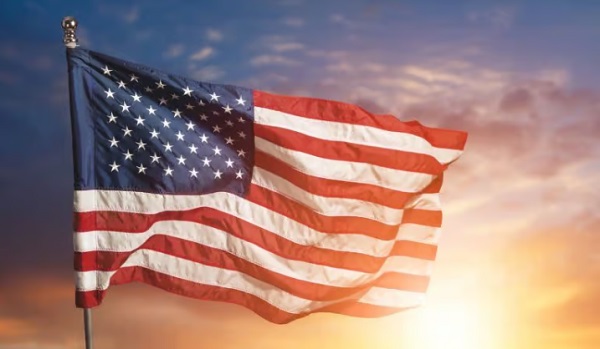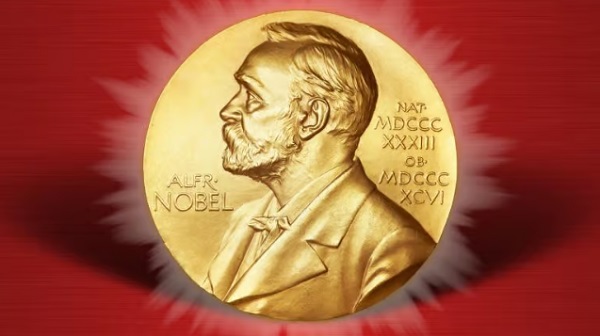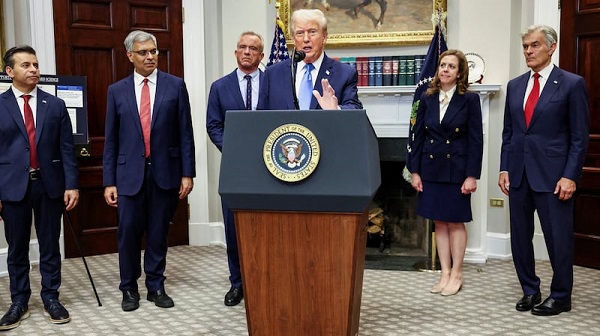Brownstone Institute
The Revolution of 2024: A Rare Victory for Anti-Establishment Fury

From the Brownstone Institute
By
The sudden coming together of three great sectors of anti-establishment fury – MAGA, MAHA, and DOGE – in the last two months of the election of 2024 is one for the ages.
People are out and about, smiling at each other. It’s been true since the morning after the election, the results of which defied every prediction. Who doesn’t like to see the smug elites who have ruled the world for five awful years taken down a peg?
More than that, there are hints of a return to sanity. Mainstream advertisers are suddenly returning to X, putting their economic interest above their tribalist loyalties. The editor of pro-lockdowns Scientific American, which had long blessed totalitarian measures as true science, has resigned.
The attempt to pillage InfoWars and give it to The Onion has been reversed by a federal judge. That might be a fluke or might not be: maybe the lawfare is dialing back too. The cabinet of the incoming administration is being filled by voices that were fully censored for years. Employees are reportedly packing their bags at the FDA and other agencies.
Mainstream news commentators are sputtering around with less bravado than they have shown in years. CNN is firing major personalities.
Trump is talking about abolishing the income tax and granting $10K in tax credits per homeschooled child, not to mention blowing up college accreditation systems, among other sweeping changes.
The American Bastille day is coming, not only freeing the political prisoners of January 6 but also many of the unjustly persecuted including Ross Ulbricht, Roger Ver, and Ian Freeman, among so many others. That will be a day of rejoicing.
Oh, and peace seems to have broken out in some contentious areas of the world, for now.
What is happening? This is not the usual transfer of the resident of the White House. This is starting to look like an actual transfer of power, not just from Biden to Trump but from the permanent government – ensconced in many sectors – that has been long in hiding to an entirely new form of government responsive to actual voters.
As it turns out, there was no late surge for Kamala Harris. All the polls were wrong, and the rest was media blather. What was correct were the betting odds on Polymarket, and only days later, the FBI raided the 26-year-old founder’s home and confiscated his phone and laptop.
There are still many millions of missing voters, people who supposedly showed up for Biden in 2020 but stayed home this time. Meanwhile, there has been a historic shift in all races, ethnicities, and regions, with even the possibility of flipping California from blue to red in the future.
After decades of academic slicing and dicing of the population according to ever more eccentric identity buckets involving race, ethnicity, gender, and sexual interest, along with countless thousands of studies documenting deep complexity over intersectionality, the driving force of the election was simple: class, and the few intellectuals and some wealthy entrepreneurs who understand that.
The division was not really left vs right. It was workers vs laptoppers, wage earners vs six-figure stay-at-homers, bottom half vs top 5 percent, people with actual skills vs weaponized resume wielders, and those with affection for old-world values vs those whose educations have beaten it out of them for purposes of career advancement.
The silent majority has never been so suddenly loud. It just so happened that the heavily privileged had come to inhabit easily identifiable sectors of American society and, in the end, had no choice but hitch the whole of the overclass wagon to the fortunes of a candidate like themselves (Kamala) but who was unable to pull off a compelling masquerade. Not even a parade of well-paid celebrity endorsements could save her from total rebuke at the polls.
Sylvester Stallone called Trump a second George Washington but another reference point might be Andrew Jackson. The overwhelming victory for Trump is on a scale not seen since 1828 when, four years after the presidency was stolen from Jackson, Old Hickory came back in a wild landslide and cleaned up Washington. Trump arrives in Washington with a mandate for the same, with 81% of the public demanding that the government shrink in size and power.
It has all happened so quickly. We are barely ten days into the realization of what just transpired and the entire lay of the land seems different, like a tectonic shift in politics, culture, mood, and possibilities. We are even seeing blunt and open talk about the horrendous Covid response that so utterly demoralized the country and the world, after years of silence on the topic. We have promised hearings coming, and court cases galore now on fast track.
The sudden coming together of three great sectors of anti-establishment fury – MAGA, MAHA, and DOGE – in the last two months of the election of 2024 is one for the ages. It provides the beginnings of an answer to the great question on our minds for decades: how precisely does an authentic revolution take root in an industrialized Western democracy? Are elections capable of delivering real results?
For now, the answer seems to be yes. That should thrill any responsible observer of social, cultural, economic, and political affairs. It means that the early architects of the American system were not wrong. The intolerable costs of political upheaval of ages past can be mitigated by planting power firmly in the hands of the people through the plebiscite. This was their view and their gamble. All the evidence of our time points to the wisdom of the idea.
In the darkest days of the last year of the first Trump presidency, the bureaucracy was riding high, in full revenge mode against an elected government it hated and sought to overthrow. The agencies were passing strange edicts that felt like laws but no one knew for sure. You are essential, you are not. You must stay home, unless you have an emergency. Your elective surgery needs to wait. The kids cannot go to school. That European vacation cannot happen. You can eat at a restaurant but only if you are six feet away from other patrons and you must put this China-made cloth on your mouth if you get up to go to the restroom.
The flurry of edicts was mind-boggling. It felt like martial law, because it was some form of exactly that. The best research points to the astonishing reality that this was never really a public-health response but a scheme by security and intelligence sectors to enact some kind of global color revolution, which is why the policies were so similar the world over. It was indeed an awesome display of power, one that invaded all our communities, homes, and families.
No one knows this better than Team Trump, even if there has been near silence on the topic for all these years. They have had time to put the pieces together and figure out what happened and why. And they carefully, and in seclusion worthy of a Cistercian monastery, plotted their return, leaving nothing to chance.
Meanwhile, the past two years have had the Covid insurrectionists quietly stepping away from the spotlight, while leaving as much of their newfound power in place: the censorship, the technology, the mandates, and the propaganda that all of this shock-and-awe was nothing more than “common sense health measures.” It was never tenable, and vast numbers have come to realize that something went very wrong, like a kind of evil settled over the world and burrowed itself within all institutions.
In an instant, the whole scheme seems to be crumbling. The incredible result is that the administration under which this calamity occurred is now coming back, which is probably the strangest irony of our times.
And yet, even though no one has yet been open about precisely what happened in the White House in March 2020 to cause Trump to greenlight the lockdowns, there is a widespread belief that it was never really his choice. It was some kind of coup – egged on even by his closest advisors and the VP – that he either could not stop or lacked the personnel to marshal effective resistance. Regardless, he has been forgiven because, implausibly, the next administration not only owned the worst of it but added even more on top of that, including the wicked combination of mask mandates, forced injections, and continued school closures.
The result has been a continuing economic crisis, one far worse than agencies admit, in addition to a health, education, and cultural crisis. Meanwhile, all those involved in causing this from behind the scenes have been rewarded with professorships, loving interviews in the mainstream media, and lavish security provisions to protect them from legions of what they suppose are angry workers and peasants.
Therefore, among many of the ruling class, the results of this election are certainly not welcome, and nor are many of the early appointments. They represent the coming together of MAGA, MAHA, and DOGE, the fulfillment of decades of cultivation of disparate groups of dissidents who had not previously realized their common interests and common enemies. It was the Covid era and the imposition of top-down rule that brought them all together.
It was like three groups wandering around in a giant maze who suddenly confront each other and then, realizing that they all shared the same predicament, figure the way out together. These new alliances have not only shattered right and left, as traditionally understood, but reshaped the structural basis of political activism for the duration. It turns out that medical freedom, food freedom, free speech, political freedom, and peace all go together. Who knew?
The incumbent world of academia, think tanks, and most media simply finds itself unprepared to deal with the new realities. They had hoped everyone would forget about the last five years as if it was just a thing that happened but is now over; everyone just needs to grapple with the great reset and learn to love our new lives of surveillance, propaganda, censorship, perpetual war, poison food, unaffordable everything, and endless injections of potions for our own health and well-being.
Well, times have changed. How much? Early signs point to a dramatic unfolding of revolutionary change over the coming months. Is believing this the triumph of hope over experience? Absolutely. Then again, no one believed five years ago that most people in the world would be locked in their homes and communities, stuck drinking and streaming movies until biotech could come up with a cure for a respiratory virus with a zoonotic reservoir. Then it did not work and made people more sick than ever.
That was nuts but it happened.
If that could happen, with predictable results, the response could be equally implausible and more much thrilling. What’s man made can be unmade by man, and something new built in its place.
Brownstone Institute
Trump Covets the Nobel Peace Prize

From the Brownstone Institute
By
Many news outlets reported the announcement of the Nobel Peace Prize on Friday by saying President Donald Trump had missed out (Washington Post, Yahoo, Hindustan Times, Huffington Post), not won (USA Today), fallen short (AP News), lost (Time), etc. There is even a meme doing the rounds about ‘Trump Wine.’ ‘Made from sour grapes,’ the label explains, ‘This is a full bodied and bitter vintage guaranteed to leave a nasty taste in your mouth for years.’

For the record, the prize was awarded to María Corina Machado for her courageous and sustained opposition to Venezuela’s ruling regime. Trump called to congratulate her. Given his own attacks on the Venezuelan president, his anger will be partly mollified, and he could even back her with practical support. He nonetheless attacked the prize committee, and the White House assailed it for putting politics before peace.
He could be in serious contention next year. If his Gaza peace plan is implemented and holds until next October, he should get it. That he is unlikely to do so is more a reflection on the award and less on Trump.
So He Won the Nobel Peace Prize. Meh!
Alfred Nobel’s will stipulates the prize should be awarded to the person who has contributed the most to promote ‘fraternity between nations…abolition or reduction of standing armies and…holding and promotion of peace congresses.’ Over the decades, this has expanded progressively to embrace human rights, political dissent, environmentalism, race, gender, and other social justice causes.
On these grounds, I would have thought the Covid resistance should have been a winner. The emphasis has shifted from outcomes and actual work to advocacy. In honouring President Barack Obama in 2009, the Nobel committee embarrassed itself, patronised him, and demeaned the prize. His biggest accomplishment was the choice of his predecessor as president: the prize was a one-finger send-off to President George W. Bush.
There have been other strange laureates, including those prone to wage war (Henry Kissinger, 1973), tainted through association with terrorism (Yasser Arafat, 1994), and contributions to fields beyond peace, such as planting millions of trees. Some laureates were subsequently discovered to have embellished their record, and others proved to be flawed champions of human rights who had won them the treasured accolade.
Conversely, Mahatma Gandhi did not get the prize, not for his contributions to the theory and practice of non-violence, nor for his role in toppling the British Raj as the curtain raiser to worldwide decolonisation. The sad reality is how little practical difference the prize has made to the causes it espoused. They bring baubles and honour to the laureates, but the prize has lost much of its lustre as far as results go.
Trump Was Not a Serious Contender
The nomination processes start in September and nominations close on 31 January. The five-member Norwegian Nobel committee scrutinises the list of candidates and whittles it down between February and October. The prize is announced on or close to 10 October, the date Alfred Nobel died, and the award ceremony is held in Oslo in early December.
The calendar rules out a newly elected president in his first year, with the risible exception of Obama. The period under review was 2024. Trump’s claims to have ended seven wars and boasts of ‘nobody’s ever done that’ are not taken seriously beyond the narrow circle of fervent devotees, sycophantic courtiers, and supplicant foreign leaders eager to ingratiate themselves with over-the-top flattery.
Trump Could Be in Serious Contention Next Year
Trump’s 20-point Gaza peace plan falls into three conceptual-cum-chronological parts: today, tomorrow, and the day after. At the time of writing, in a hinge moment in the two-year war, Israel has implemented a ceasefire in Gaza, Hamas has agreed to release Israeli hostages on 13-14 October, and Israel will release around 2,000 Palestinian prisoners (today’s agenda). So why are the ‘Ceasefire Now!’ mobs not out on the streets celebrating joyously instead of looking morose and discombobulated? Perhaps they’ve been robbed of the meaning of life?
The second part (tomorrow) requires Hamas demilitarisation, surrender, amnesty, no role in Gaza’s future governance, resumption of aid deliveries, Israeli military pullbacks, a temporary international stabilisation force, and a technocratic transitional administration. The third part, the agenda for the day after, calls for the deradicalisation of Gaza, its reconstruction and development, an international Peace Board to oversee implementation of the plan, governance reforms of the Palestinian Authority, and, over the horizon, Palestinian statehood.
There are too many potential pitfalls to rest easy on the prospects for success. Will Hamas commit military and political suicide? How can the call for democracy in Gaza and the West Bank be reconciled with Hamas as the most popular group among Palestinians? Can Israel’s fractious governing coalition survive?
Both Hamas and Israel have a long record of agreeing to demands under pressure but sabotaging their implementation at points of vulnerability. The broad Arab support could weaken as difficulties arise. The presence of the internationally toxic Tony Blair on the Peace Board could derail the project. Hamas has reportedly called on all factions to reject Blair’s involvement. Hamas official Basem Naim, while thanking Trump for his positive role in the peace deal, explained that ‘Palestinians, Arabs and Muslims and maybe a lot [of] people around the world still remember his [Blair’s] role in causing the killing of thousands or millions of innocent civilians in Afghanistan and Iraq.’
It would be a stupendous achievement for all the complicated moving parts to come together in stable equilibrium. What cannot and should not be denied is the breathtaking diplomatic coup already achieved. Only Trump could have pulled this off.
The very traits that are so offputting in one context helped him to get here: narcissism; bullying and impatience; bull in a china shop style of diplomacy; indifference to what others think; dislike of wars and love of real estate development; bottomless faith in his own vision, negotiating skills, and ability to read others; personal relationships with key players in the region; and credibility as both the ultimate guarantor of Israel’s security and preparedness to use force if obstructed. Israelis trust him; Hamas and Iran fear him.
The combined Israeli-US attacks to degrade Iran’s nuclear capability underlined the credibility of threats of force against recalcitrant opponents. Unilateral Israeli strikes on Hamas leaders in Qatar highlighted to uninvolved Arabs the very real dangers of continued escalation amidst the grim Israeli determination to rid themselves of Hamas once and for all.
Trump Is Likely to Be Overlooked
Russia has sometimes been the object of the Nobel Peace Prize. The mischievous President Vladimir Putin has suggested Trump may be too good for the prize. Trump’s disdain for and hostility to international institutions and assaults on the pillars of the liberal international order would have rubbed Norwegians, among the world’s strongest supporters of rules-based international governance, net zero, and foreign aid, the wrong way.
Brash and public lobbying for the prize, like calling the Norwegian prime minister, is counterproductive. The committee is fiercely independent. Nominees are advised against making the nomination public, let alone orchestrating an advocacy campaign. Yet, one laureate is believed to have mobilised his entire government for quiet lobbying behind the scenes, and another to have bad-mouthed a leading rival to friendly journalists.
Most crucially, given that Scandinavian character traits tip towards the opposite end of the scale, it’s hard to see the committee overlooking Trump’s loud flaws, vanity, braggadocio, and lack of grace and humility. Trump supporters discount his character traits and take his policies and results seriously. Haters cannot get over the flaws to seriously evaluate policies and outcomes. No prizes for guessing which group the Nobel committee is likely to belong to. As is currently fashionable to say when cancelling someone, Trump’s values do not align with those of the committee and the ideals of the prize.
Autism
Trump Blows Open Autism Debate

From the Brownstone Institute
By
Trump made sweeping claims that would have ended political careers in any other era. His health officials tried to narrow the edges, but the President ensured that the headlines would be his.
Autism has long been the untouchable subject in American politics. For decades, federal agencies tiptoed around it, steering research toward genetics while carefully avoiding controversial environmental or pharmaceutical questions.
That ended at the White House this week, when President Donald Trump tore through the taboo with a blunt and sometimes incendiary performance that left even his own health chiefs scrambling to keep pace.
Flanked by Health Secretary Robert F. Kennedy, Jr., NIH Director Jay Bhattacharya, FDA Commissioner Marty Makary, CMS Adminstrator Dr Mehmet Oz, and other senior officials, Trump declared autism a “horrible, horrible crisis” and recounted its rise in startling terms.
“Just a few decades ago, one in 10,000 children had autism…now it’s one in 31, but in some areas, it’s much worse than that, if you can believe it, one in 31 and…for boys, it’s one in 12 in California,” Trump said.
The President insisted the trend was “artificially induced,” adding: “You don’t go from one in 20,000 to one in 10,000 and then you go to 12, you know, there’s something artificial. They’re taking something.”
Trump’s Blunt Tylenol Warning
The headline moment came when Trump zeroed in on acetaminophen, the common painkiller sold as Tylenol — known as paracetamol in Australia.
While Kennedy and Makary described a cautious process of label changes and physician advisories, Trump dispensed with nuance.
“Don’t take Tylenol,” Trump said flatly. “Don’t take it unless it’s absolutely necessary…fight like hell not to take it.”
Kennedy laid out the evidence base, citing “clinical and laboratory studies that suggest a potential association between acetaminophen used during pregnancy and adverse neurodevelopmental outcomes, including later diagnosis for ADHD and autism.”
Makary reinforced the point with references to the Boston Birth Cohort, the Nurses’ Health Study, and a recent Harvard review, before adding: “To quote the dean of the Harvard School of Public Health, there is a causal relationship between prenatal acetaminophen use and neurodevelopmental disorders of ADHD and autism spectrum disorder. We cannot wait any longer.”
But where the officials spoke of “lowest effective dose” and “shortest possible duration,” Trump thundered over the top: “I just want to say it like it is, don’t take Tylenol. Don’t take it if you just can’t. I mean, it says, fight like hell not to take it.”
Vaccines Back on Center Stage
The President then pivoted to vaccines, reviving arguments that the medical establishment has long sought to bury. He blasted the practice of giving infants multiple injections at a single visit.
“They pump so much stuff into those beautiful little babies, it’s a disgrace…you get a vat of 80 different vaccines, I guess, 80 different blends, and they pump it in,” Trump said.
His solution was simple: “Go to the doctor four times instead of once, or five times instead of once…it can only help.”
On the measles, mumps, and rubella shot, Trump insisted: “The MMR, I think should be taken separately…when you mix them, there could be a problem. So there’s no downside in taking them separately.”
The moment was astonishing — echoing arguments that had once seen doctors like Andrew Wakefield excommunicated from medical circles.
It was the kind of line of questioning the establishment had spent decades trying to banish from mainstream debate.
Hep B Vaccine under Attack
Trump dismissed the rationale for giving the hepatitis B vaccine at birth.
“Hepatitis B is sexually transmitted. There’s no reason to give a baby that’s just born hepatitis B [vaccine]. So I would say, wait till the baby is 12 years old,” he said.
He made clear that he was “not a doctor,” stressing that he was simply offering his personal opinion. But the move could also be interpreted as Trump choosing to take the heat himself, to shield Kennedy’s HHS from what was sure to be an onslaught of criticism.
The timing was remarkable.
Only last week, the CDC’s Advisory Committee on Immunisation Practices (ACIP) had been preparing to vote on whether to delay the hepatitis B shot until “one month” of age — a modest proposal that mainstream outlets derided as “anti-vax extremism.”
By contrast, Trump told the nation to push the jab back 12 years. His sweeping denunciations made the supposedly radical ACIP vote look almost tame.
The irony was inescapable — the same media voices who had painted Kennedy’s reshaped ACIP as reckless now faced a President willing to say far more than the panel itself dared.
A New Treatment and Big Research Push
The administration also unveiled what it deemed a breakthrough: FDA recognition of prescription leucovorin, a folate-based therapy, as a treatment for some autistic children.
Makary explained: “It may also be due to an autoimmune reaction to a folate receptor on the brain not allowing that important vitamin to get into the brain cells…one study found that with kids with autism and chronic folate deficiency, two-thirds of kids with autism symptoms had improvement and some marked improvement.”
Dr Oz confirmed Medicaid and CHIP (the Children’s Health Insurance Program, which provides low-cost health coverage to children in families that earn too much to qualify for Medicaid) would cover the treatment.
“Over half of American children are covered by Medicaid and CHIP…upon this label change…state Medicaid programs will cover prescription leucovorin around the country, it’s yours,” said Oz.
Bhattacharya announced $50 million in new NIH grants under the “Autism Data Science Initiative.”
He explained that 13 projects would be funded using “exposomics” — the study of how environmental exposures like diet, chemicals, and infections interact with our biology — alongside advanced causal inference methods.
“For too long, it’s been taboo to ask some questions for fear the scientific work might reveal a politically incorrect answer,” Bhattacharya said. “Because of this restricted focus in scientific investigations, the answers for families have been similarly restricted.”
Mothers’ Voices
The press conference also featured raw testimony from parents.
Amanda, mother of a profoundly autistic five-year-old, told Trump: “Unless you’ve lived with profound autism, you have no idea…it’s a very hopeless feeling. It’s very isolating. Being a parent with a profound autistic child, even just taking them over to your friend’s house is something we just don’t do.”
Jackie, mother of 11-year-old Eddie, said: “I’ve been praying for this day for nine years, and I’m so thankful to God for bringing the administration into our lives…I never thought we would have an administration that was courageous enough to look into things that no prior administration had.”
Their stories underscored what Kennedy said at the announcement about “believing women.” Here were mothers speaking directly about their lived reality, demanding that uncomfortable conversations could no longer be avoided.
Clashes with the Press Corps
Reporters pressed Trump on the backlash from medical groups.
Asked about the American College of Obstetricians and Gynecologists (ACOG) declaring acetaminophen safe in pregnancy, Trump shot back, “That’s the establishment. They’re funded by lots of different groups. And you know what? Maybe they’re right. I don’t think they are, because I don’t think the facts bear it out at all.”
When one journalist raised the argument that rising diagnoses reflected better recognition, Kennedy bristled,
“That’s one of the canards that has been promoted by the industry for many years,” he said. “It’s just common sense, because you’re only seeing this in people who are under 50 years of age. If it were better recognition or diagnosis, you’d see it in the seventy-year-old men. I’ve never seen this happening in people my age.”
Another reporter then asked Trump, “Should the establishment media show at least some openness to trying to figure out what the causes are?”
“I wish they would. Yeah, why are they so close-minded?” Trump replied. “It’s not only the media, in all fairness, it’s some people, when you talk about vaccines, it’s crazy…I don’t care about being attacked.”
Breaking the Spell
For years, autism policy has been shaped by caution, consensus, and deference to orthodox positions. That spell was broken at today’s press conference.
The dynamic was striking. Kennedy, Makary, Bhattacharya, and Oz leaned on scientific papers, review processes, and cautious advisories. Trump, by contrast, brushed it all aside, hammering his message home through repetition and personal anecdotes.
Trump made sweeping claims that would have ended political careers in any other era. His health officials tried to narrow the edges, but the President ensured that the headlines would be his.
“This will be as important as any single thing I’ve done,” Trump declared. “We’re going to save a lot of children from a tough life, really tough life. We’re going to save a lot of parents from a tough life.”
Whatever the science ultimately shows, the politics of autism in America will never be the same.
Republished from the author’s Substack
-

 Energy23 hours ago
Energy23 hours agoMinus Forty and the Myth of Easy Energy
-

 Uncategorized23 hours ago
Uncategorized23 hours agoNew report warns WHO health rules erode Canada’s democracy and Charter rights
-

 Business3 hours ago
Business3 hours agoQuebecers want feds to focus on illegal gun smuggling not gun confiscation
-

 Frontier Centre for Public Policy1 day ago
Frontier Centre for Public Policy1 day agoOttawa Should Think Twice Before Taxing Churches
-

 Alberta1 day ago
Alberta1 day agoBusting five myths about the Alberta oil sands
-

 Business1 day ago
Business1 day agoUS government buys stakes in two Canadian mining companies
-

 Crime21 hours ago
Crime21 hours agoFrance stunned after thieves loot Louvre of Napoleon’s crown jewels
-

 Business3 hours ago
Business3 hours agoEmission regulations harm Canadians in exchange for no environmental benefit










